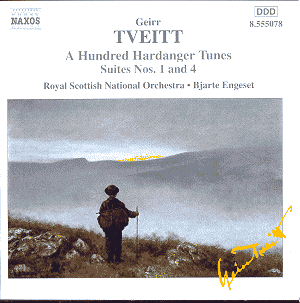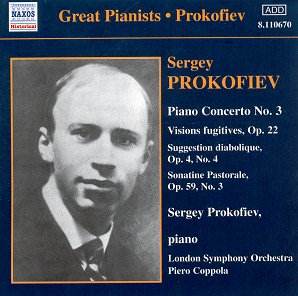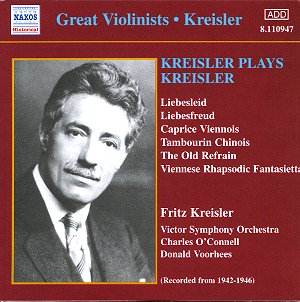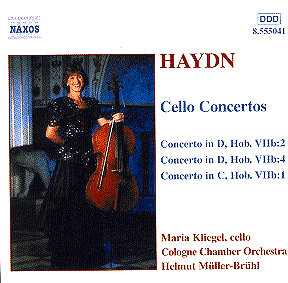 Composer: Geirr Tveitt
Composer: Geirr Tveitt
Works: 100Tunes, Suites 1&4
Performer: Royal Scottish National Orchestra conducted by Bjarte Engeset
Label: Naxos 8.555078
Recording Date: April 2000
Duration: 60.36
Review Date: October 2001
Geirr Tveitt (1908-1981) was a composer whose works remain a testament to the rich tapestry of Norwegian folk music, and this recording of his Hundrad Hardingtonar, or A Hundred Hardanger Tunes, alongside Suites 1 and 4, serves as both a delightful introduction and a profound exploration of his artistic vision. The Royal Scottish National Orchestra, under the baton of Bjarte Engeset, brings these vibrant melodies to life with a refreshing authenticity that resonates with Tveitt’s cultural heritage.
The Hundrad Hardingtonar, comprising thirty orchestrated tunes from the Hardanger region, is a compelling representation of Tveitt’s ability to fuse folk traditions with classical orchestral forms. The composer’s background—studying under the likes of Honegger and Wellesz in Vienna and Paris—introduces a sophisticated harmonic language that complements the simplicity of folk tunes. This juxtaposition is vividly illustrated in Suite 1, specifically in the movement Echo from the summer hillfarm, where Tveitt employs percussive elements to invoke the sounds of nature, creating an almost programmatic atmosphere. The gunshot cracks mentioned in the booklet notes are skillfully orchestrated, effectively awakening a sonorous landscape that evokes familial ties and ancestral connections.
The world premiere recording of Suite 4 is particularly noteworthy, showcasing Tveitt’s narrative prowess. It is a whimsical portrayal of a wedding, unfolding with a delightful series of events—from the couple’s tentative courtship to the raucous celebrations that ensue. The bridal voyage (Track 23) is a standout moment, where Engeset’s interpretation shines through the use of glissandi on the piano and rustling harp, creating an evanescent quality that suggests both movement and a sense of reverie. The attention to detail in this orchestration reflects Tveitt’s keen ear for color and textural variety, positioning him as a master of orchestral storytelling.
Engeset’s conducting is characterized by an innate understanding of Tveitt’s musical idiom. He encourages the orchestra to embrace the folk influences without succumbing to sentimentality, ensuring that the performance remains grounded in authentic expression. The Royal Scottish National Orchestra, with its natural rapport with northern music, executes these intricate passages with both precision and warmth, revealing the emotional depth embedded within Tveitt’s melodies. The ensemble’s ability to navigate the delicate balances of lightness and profundity is particularly effective in The bride’s drink (Track 28), where the humorous portrayal of the bride’s inebriation comes alive through playful bassoon trills and spirited orchestral interjections.
In technical terms, the recording quality is commendable, with the engineering capturing the richness of the orchestral palette without sacrificing clarity. The spatial balance is well-managed, allowing for the intricate interplay between the strings, woodwinds, and brass to be appreciated in their full glory. It is evident that Naxos has prioritized a sound that reflects the acoustic character of Henry Wood Hall, enhancing the listening experience.
Historically, Tveitt’s output was significantly marred by the tragic loss of much of his music in a fire at his family farmstead in 1970. This recording of Suites 1 and 4 thus holds particular significance, not only as a preservation of his musical legacy but also as a vital contribution to the understanding of Norwegian nationalism in music. The folk tunes, which were often tied to specific families and regions due to the geographical isolation of the Hardanger area, speak to a cultural identity that Tveitt sought to celebrate. The nuances of these melodies reflect the intricacies of rural life in Norway, making them a valuable addition to both the orchestral repertoire and the discourse on national identity in music.
In conclusion, this recording of Tveitt’s Hundrad Hardingtonar and Suites 1 and 4 is an essential exploration of a composer whose work resonates with the spirit of his homeland. Bjarte Engeset’s insightful interpretation, combined with the Royal Scottish National Orchestra’s vibrant performance, brings Tveitt’s folk-inspired orchestral visions to life in a manner that is both respectful and enlightening. This release not only enriches our understanding of Tveitt’s oeuvre but also invites listeners to appreciate the broader context of Norwegian folk traditions within the classical canon. Highly recommended for those seeking to delve deeper into the intersection of folk and classical music.



